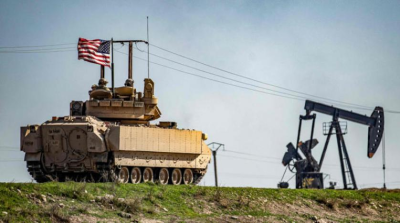NOVANEWS

While President Barack Obama’s top political and military advisers deliberate on how best to address the growing crisis in Iraq, a small army of battle-hardened Islamic extremists, volunteers and ex-Baathists have swept to within 50 miles of Baghdad threatening to seize the Capital, topple the government of President Nouri al-Maliki and ignite another firestorm of sectarian violence. Although Obama has characterized the bloody onslaught as an “emergency situation” requiring a prompt response, he has not yet committed to particular course of action. Meanwhile, the increasingly-anxious residents of Baghdad are hurriedly stocking up on food and bottled water figuring that another war could be just hours away.
Even now, little is known about the shadowy group of Sunni radicals who call themselves the Islamic State of Iraq and the Levant (ISIS). What is known, however, is that they are an extremely proficient military force that can strike with lightening speed, dispatch their better-equipped adversaries effortlessly, and enlist the support of the local people to join their ranks. ISIS could never have captured a city the size of Mosul unless the bulk of the population saw them as liberators not occupiers. It’s clear that al-Maliki has failed to win the hearts and minds of the people in the Sunni heartland where he is seen as a dispassionate tyrant who rules with an iron fist. Still, none of this explains why the ISIS has emerged from obscurity just recently or what their real objectives are. Here’s a clip from the Alakhbar News that helps answer that question:
“A lot of theories are being bandied about…The most logical analysis leans in two directions that meet at some point. The first argues that ISIS… sensed a US-Iranian understanding on the horizon and the signs of a regional front emerging to liquidate the takfiri Islamist movement including ISIS. The seeds of this front emerged first in Syria, and its signs were detectable in Iraq given the talk about military preparations and arms deals to regain state control over al-Anbar province. All this prompted ISIS to wage a preemptive strike to fortify its positions and prepare for the crushing battle expected to come.
The second direction alludes to an operation meant to lure ISIS into a trap similar to what the United States did with Saddam Hussein before he invaded Kuwait in order to rally regional support to eliminate him…..The international reaction to the fall of Mosul reinforces the second analysis. ” (Theories behind the ISIS takeover of Iraqi province, al-Akakhbar)
So, is ISIS march on Baghdad a preemptive strike designed to undermine a US-Iranian alliance that would sabotage their political future or has the disparate militia been lured into a trap? It is impossible to say at the present time, but at least one veteran journalist thinks he knows where the groups funding comes from. Here’s a short excerpt from an article by Robert Fisk with the revealingly title “Iraq crisis: Sunni caliphate has been bankrolled by Saudi Arabia”:
“So after the grotesquerie of the Taliban and Osama bin Laden and 15 of the 19 suicide killers of 9/11, meet Saudi Arabia’s latest monstrous contribution to world history: the Islamist Sunni caliphate of Iraq and the Levant, conquerors of Mosul and Tikrit – and Raqqa in Syria – and possibly Baghdad, and the ultimate humiliators of Bush and Obama.
From Aleppo in northern Syria almost to the Iraqi-Iranian border, the jihadists of Isis and sundry other groupuscules paid by the Saudi Wahhabis – and by Kuwaiti oligarchs – now rule thousands of square miles…
Remember that the Americans captured and recaptured Mosul to crush the power of Islamist fighters. They fought for Fallujah twice. And both cities have now been lost again to the Islamists. The armies of Bush and Blair have long gone home, declaring victory.
Under Obama, Saudi Arabia will continue to be treated as a friendly “moderate” in the Arab world, even though its royal family is founded upon the Wahhabist convictions of the Sunni Islamists in Syria and Iraq – and even though millions of its dollars are arming those same fighters. Thus does Saudi power both feed the monster in the deserts of Syria and Iraq and cozy up to the Western powers that protect it.” (Iraq crisis: Sunni caliphate has been bankrolled by Saudi Arabia, Belfast Telegraph)
Fisk is not alone in pinning the blame on Saudi Arabia. There’s also this from Al-Thawra news which is Syrian state media:
“Terrorism is spreading in front of the eyes of the western world… and alongside it are the fingers of Saudi Arabia, providing money and arms…In the events in Iraq and the escalating terrorist campaign, no Western country is unaware of the role Saudi is playing in supporting terrorism and funding and arming different fronts and battles, both inside and outside Iraq and Syria.
The emergence of these organizations is not the result of a vacuum but rather long and clear support for terrorism… which the Gulf has dedicated its finances to expanding.” (These actions were taken) “with Western knowledge and in most cases clear and explicit orders.” (Saudi behind ISIS onslaught in Iraq: Syrian state media, Alakhbar)
While neither Fisk nor al-Thawra provide any proof of their claims, we suspect that when the money-trail is finally uncovered, the evidence will once again point to Riyadh, the Capital of global terrorism. Here’s more from Alakhbar:
“Iraqi Prime Minister Nouri al-Maliki addressed his military officers on TV in light of security reports stating that the attackers are Baathists affiliated with Izzat Ibrahim al-Douri – who was vice president under Saddam – as well as officers from the former Iraqi army and Fedayeen Saddam. According to the reports, more than 40 officers who had served in Saddam Hussein’s army conspired with the attackers. There are tales of betrayal involving senior military leaders including General Abboud Qanbar, Lieutenant General Ali Ghaidan and General Mahdi al-Ghazzawi, all members of the former army.” (ISIS “success” facilitated by betrayal, Iraqi government inadequacies, Alakhbar)
So the ISIS is not just a group of disgruntled jihadis after all. The ranks of full of ex-Baathists and professional military who are ready for a winner-take-all, no-holds-barred clash in Baghdad.
And what does al-Maliki intend to do to defend the capital from this rampaging horde of highly-motivated, combat-tested Sunni troopers?
He plans to launch an enlistment campaign to organize a “popular army” similar to the National Defense Forces in Syria.
Got that? The ISIS militia is just a few miles from Baghdad and al-Maliki thinks he’s going to whip up an army in the next couple hours that will repel them.
Good luck with that, Mr President.
Of course, many people feel that Obama and Co. are just pretending to be surprised at the sudden turn of events; that they actually knew something like this was brewing all along but decided to look the other way figuring that the ISIS’s aggression would help to implement their larger regional strategy to disempower Arab-controlled nation-states by erasing existing borders and creating a “soft partition” that would strengthen US-Israeli hegemony making it easier to repress the indigenous population and pilfer their resources. This is from an article by Al Hayat correspondent, Raghida Dergham:
“While ISIS, with its haphazardness, destructive ideology, and appalling ignorance, spreads from Deir al-Zour to the borders of Kurdistan, achieving its wretched victories, regional and international powers are rushing to take advantage of the situation to further their interests…
All trans-border armies think themselves as makers of a new history by overturning Sykes-Picot. These are the armies of destroying and abolishing borders. As it seems, no one is standing in their way no matter how much NATO powers pretend to be panicked and no matter how many concerned statements the United Nations make. What is frightening is that there are international forces supporting mobile radical armies in their bid to cross borders, to use them in wars of attrition against traditional armies, with a view to partition existing countries in the Arab region.
ISIS not the response to the plans to fragment the Arab region and strengthen Iranian hegemony but is actually an instrument in those plans, whether ISIS is aware of this or naïvely oblivious to the fact. ISIS is destroying the Arabs and undermining Sunni moderates, because it is part of a sinister project to which it was driven voluntarily or by coincidence. All those extending help to ISIS and similar groups like al-Nusra Front, and other Salafist or Wahhabi militias, are directly contributing to the collapse of Syria and Iraq, no matter how much they think they are making history.
Iraq today is on the brink of collapsing into civil war and partition, if not fragmentation. No one will come out victorious in the coming Iraq war.” (ISIS ‘Achievements’ in Iraq and Syria a Gift to the Iranian Negotiator?, Raghida Dergham, Huffington Post)
The author clearly believes that Iran is a big player in these regional games of power politics, but as she concedes later in the article: “the United States is not innocent of these plans. In the minds of many, it is the side that manufactures and encourages extremism, be it Sunni or Shiite, to divide the Arab region and allow Iran to dominate it, with Israeli collusion.”
Isn’t this what’s really going on? While outside observers may not know the particular details, they can assume with some confidence that foreign powerbrokers — Iran, Saudi Arabia, Israel, and the US — are all deeply involved and are looking for ways to shape the outcome. All four of these countries are up to their axels in the bloody game of geopolitics, and are using Iraq as a staging ground for the own hegemonic ambitions.
Although we have no idea what will happen in the next few weeks, we know who the losers will be in this latest regional slugfest, the Iraqi people.



